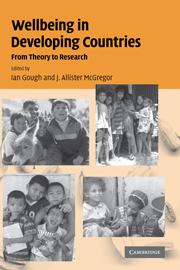Book contents
- Frontmatter
- Contents
- Figures
- Tables
- Notes on contributors
- Acronyms
- Preface
- Introduction
- 1 Theorising wellbeing in international development
- Part I Human needs and human wellbeing
- Part II Resources, agency and meaning
- 7 Wellbeing, livelihoods and resources in social practice
- 8 Livelihoods and resource accessing in the Andes: desencuentros in theory and practice
- 9 Poverty and exclusion, resources and relationships: theorising the links between economic and social development
- Part III Quality of life and subjective wellbeing
- Conclusion: researching wellbeing
- References
- Index
9 - Poverty and exclusion, resources and relationships: theorising the links between economic and social development
Published online by Cambridge University Press: 22 September 2009
- Frontmatter
- Contents
- Figures
- Tables
- Notes on contributors
- Acronyms
- Preface
- Introduction
- 1 Theorising wellbeing in international development
- Part I Human needs and human wellbeing
- Part II Resources, agency and meaning
- 7 Wellbeing, livelihoods and resources in social practice
- 8 Livelihoods and resource accessing in the Andes: desencuentros in theory and practice
- 9 Poverty and exclusion, resources and relationships: theorising the links between economic and social development
- Part III Quality of life and subjective wellbeing
- Conclusion: researching wellbeing
- References
- Index
Summary
Introduction
Debates about development hinge in no small measure on the importance people attach to material resources versus social relationships, both as ends and as means. These are particularly evident when one person or group seeks to help another. A food transfer, for example, can be condemned as patronage or applauded as social protection, depending upon the social and symbolic compromises bundled up with it. Development is never as simple as it seems, and the full significance of any one action can only be assessed as part of a wider analysis of how poverty and other welfare outcomes are produced in a particular time and place. While ultimately interested in the general question of how best to identify opportunities (public and private) for action to reduce poverty, the chapter is more modest in scope. Its method is to summarise one particular approach to structural analysis of poverty (social exclusion theory as elaborated by the Peruvian economist Adolfo Figueroa) and to subject it to constructive criticism. In so doing, it seeks to contribute towards general understanding of how inventories of resource endowments are only as useful as the accompanying analysis of exclusionary/inclusionary processes arising from their use.
There is a strong Latin American tradition – embracing dependency theory, structuralism, liberation theology, Freirian pedagogy and postdevelopmentalism – of emphasising the importance of relational dimensions of development alongside the material.
- Type
- Chapter
- Information
- Wellbeing in Developing CountriesFrom Theory to Research, pp. 199 - 216Publisher: Cambridge University PressPrint publication year: 2007
- 6
- Cited by



